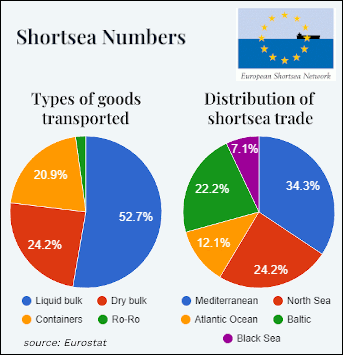
For the decarbonisation of short sea shipping beam, which can have a fundamental impact in the process of reduction of transport emissions to which the Union is aiming European, investments and incentives are needed. That's how much it is emerged from the conference "Short Sea Shipping: Challenges and Opportunities Towards 2027" which was organized by RAM Logistica, Infrastrutture e Trasporti Spa as national office for the promotion of short sea shipping, during the year of Italian presidency of the European Short Sea Network (ESN) and which was held today as part of the fifth edition of Naples Shipping Week, the dedicated international week to shipping and logistics that is promoted and organized from the Propeller Club and Clickutility Team.
It was highlighted that, being the transport sector one of the crucial areas where to reduce CO2 emissions, the role which has proximity maritime transport is already very significant, with a market share of 61.2% of the goods that it passes through the main European ports. In particular, Italy is the first country in the EU-27 for traffic volumes handled through short sea shipping and has always played a role decisive in promoting the mode of transport maritime covering short-haul distances and well matching with intermodality. According to RAM estimates, in addition, in the 2021 the ro-ro segment exceeded the volumes of 2019 after the beating of 2020 shutdown due to the Covid-19 pandemic crisis.
Referring to the need for investments and incentives for the decarbonization of short sea shipping and the content of the ESN paper entitled "Short Sea Shipping: Challenges and Opportunities towards 2027" which is open to a public consultation until 31 October and will be presented to the competent European institutions, the Director operative of RAM, Francesco Benevolo, highlighted that "the paper highlights the role of private investment in fostering transition to decarbonisation and digital management of Processes. Environmental sustainability, therefore - he noted - it will have to be combined also in the light of sustainability economic transport, thanks to appropriate policies of stimulating transport demand and taking into account the centrality of the so-called cargo owners».
During the meeting it was recalled that, in addition to the resources allocated by the EU for the period 2021-2027, NextGenerationEU provides for 37% of €807 billion for neutrality climate and 30% to digitalization and that part of these funds can then be transformed into direct investments on physical and virtual infrastructures and in incentives also aimed at maritime and port operators. "Let's start from the assumption - noted Kurt Bodewig, European coordinator for motorways of the Sea - that resources are however limited so the investments must be decided with maximum involvement Stakeholder. The EU puts in place several lines of financing, from the Structural Funds to the Innovation Funds passing through the emission trading scheme. So far - he noted Bodewig - national governments have allocated few shares of these funds for maritime transport. The increase in these resources can therefore represent in the coming years a potential of development and acceleration».
